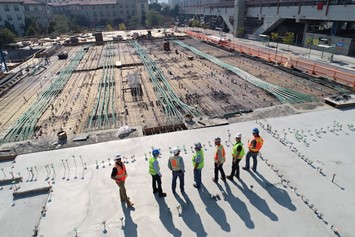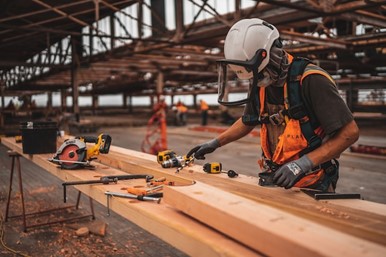
Angel Bernal Robles works as an engineer for a mixed-use real estate development company in Texas. In the following article, Angel Bernal Robles discusses the complexity of the real estate development process, as it can be hard to understand, as well as project phases and timelines.
The real estate development process is complex. However, in order to maximize the success of real estate projects, understanding development procedures is integral. Angel Bernal Robles outlines some of the most critical factors involved, including the importance of each stage and the potential ramifications of making mistakes here.
The Texan Real Estate Development Process
Angel Bernal Robles explains that during real estate development, an investor works to acquire a property or piece of land to upgrade or improve it compared to its current standard. This term encompasses building work, renovations, and refurbishments alike.
There are
three integral parts to this procedure. These are as follows:
- Pre-development: Angel Bernal Robles says that the pre-development stage encompasses the majority of the research regarding the investment. In pre-development, investors may consider the likelihood of making a profit. They should also look at the opportunities and the overall feasibility.
- Construction: As the name would suggest, during the construction phase, investors begin working on the property itself. Common aspects of the construction phase include vertical construction, marketing, pre-leasing, etc.
- Operation: The concluding stage is operation. In other words, at this point, the project is nearing completion. Therein, the finished property can be marketed to the public, and residents moving in.
Important Considerations During Each Stage
During each stage, there are several integral factors that managers must consider. In line with this, the onus is often on careful planning and preparation to ensure that all necessities are in place prior to the commencement of the venture.
In the first phase, Angel Bernal Robles says that managers have a key responsibility to ensure that all processes are in place, ready to begin the second stage. One of the most commonly overlooked factors is the importance of ensuring all permits, due diligence procedures, and environmental reports/surveys are complete.
After the first stage, and during the construction phase, it’s important for developers to begin preparations for the final process (operations). Indeed, while the focus of the construction phase is primarily on building and renovation works, it’s also critical to prepare in advance. Angel Bernal Robles says that doing so helps ensure a seamless transition into the final role.
Lastly, during the final operation stage, ensuring the real estate venture is successfully monetized to deliver promising returns is fundamental. Thorough budget analysis during the pre-development stage should make it easy to determine the appropriate price to charge. There are several potential earning methods available, such as leasing and reselling.

Which Process Has the Highest Risk
All three stages come with the risk involved. However, the severity of the
risk fluctuates significantly across the three phases. Moreover, Angel Bernal Robles says that it’s critical to keep in mind that the highest-risk process will largely depend on the nature of the project.
On the whole, the pre-development stage tends to encompass the greatest amount of risk overall. This is since the decisions made during the pre-investment process can significantly impact the final success and profitability of the venture. If poor decisions are made here, the final level of risk may become unsustainable.
With that being said, one imperative factor to note is that each project is unique. Moreover, without the necessary planning, a project could potentially find itself running short of financing during the construction – or, occasionally, the operation – phases. Angel Bernal Robles explains that this may pose even more of an issue, as investments taken out here may come with greater risk.
How Long Does the Entire Procedure Take
There is no set time frame for how long real estate development processes should take. This often comes down to the experience of the developer, the scale of the project, and the availability of resources.
Nevertheless, Angel Bernal Robles explains that most processes will take at least a year. Several years are also common. Only rarely will the full cycle be completed in a matter of months. In such cases, the total project likely required very little work or was not finished in its entirety.
Final Thoughts
The real estate development process is a complex procedure. Naturally, as with any form of investment, numerous different factors must be considered at any one time. Moreover, without carefully assessing the potential challenges associated with future stages, investors may find themselves in a precarious situation with a property that’s likely to be unprofitable.
Fortunately, with careful planning and pre-assessment of development properties, avoiding problematic investments becomes easier. This often takes several months or years for planning alone; as such, prior to dedicating themselves to a project, investors must carefully determine whether the project is lucrative.
 Angel Bernal Robles works as an engineer for a mixed-use real estate development company in Texas. In the following article, Angel Bernal Robles discusses the complexity of the real estate development process, as it can be hard to understand, as well as project phases and timelines.
The real estate development process is complex. However, in order to maximize the success of real estate projects, understanding development procedures is integral. Angel Bernal Robles outlines some of the most critical factors involved, including the importance of each stage and the potential ramifications of making mistakes here.
Angel Bernal Robles works as an engineer for a mixed-use real estate development company in Texas. In the following article, Angel Bernal Robles discusses the complexity of the real estate development process, as it can be hard to understand, as well as project phases and timelines.
The real estate development process is complex. However, in order to maximize the success of real estate projects, understanding development procedures is integral. Angel Bernal Robles outlines some of the most critical factors involved, including the importance of each stage and the potential ramifications of making mistakes here.
